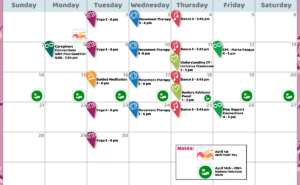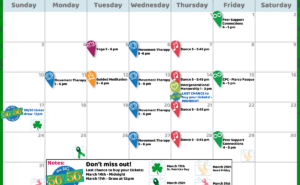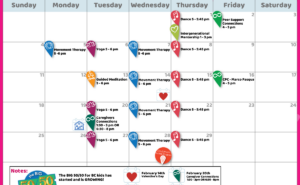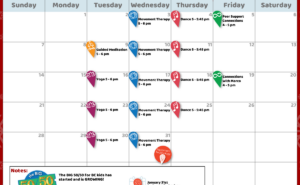By Melissa Lyon

Hear Me Out
OK, OK…I know this article is not going to be the most popular, but please hear me out.
I want to talk to you about the increasingly popular practice of allowing dogs into indoor public and private spaces. I’m not talking about Guide dogs or other service animals, which are well-trained and should be legally accepted into any place that they are needed. I am talking about everyday dogs – your cute little Fido that you just don’t want to be apart from.
A Barrier to Inclusion
In my hometown alone, there are over 500 businesses that now allow dogs to accompany their owners while attending appointments, going on shopping trips, or partaking in recreational activities. Just the other day I was waiting for my physiotherapy appointment and a barking, yappy dog entered the waiting room. Being a person with a disability, this is a REAL problem for me! Barking dogs are one of my biggest triggers for having seizures. It’s pretty much inevitable – a dog barks, I have a seizure. Because of this, I am very careful where I go in an effort to avoid dogs, but lately it has been nearly impossible to predict where they might be! I have seen dogs in banks, grocery stores, shopping centres, and even at one of my favourite activities, which is mini-golf.
Dogs and Disabilities Don’t Always Mix
I am not alone in having issues with dogs. Many people with disabilities have difficulties when dogs are around. Issues can include sensory overload, allergies, panic attacks, phobias, and being bowled over by a dog due to a lack of balance from a disability. You might be surprised to hear that 11% of people have reported being afraid of dogs. That’s a pretty large percentage of people that may work at or visit your business and be uncomfortable with dog-friendly policies.
People with disabilities are not the only reasons to think twice before creating policies that allow dogs in workplaces. Dogs can be distracting, which is counter-productive because it takes employees away from their work. Dogs can also be disobedient, especially if there are other dogs around. There may also be clean-up issues that arise – imagine stepping in dog poop just as you are about to meet with an important client! As well, there is the legal aspect of dogs in the workplace as employers may be liable if injuries or accidents happen due to dog-friendly policies.
Some Alternate Solutions
I would like to suggest a few alternate solutions that may make businesses more inclusive to those who have problems being around dogs. Maybe there could be designated dog-free days, so that people who have issues with dogs have an option to visit the business on those days. Another idea is to provide a separate onsite doggy daycare for both employees and customers to access. As well, for those employees who have their dogs at work, instead maybe they could be given flexibility of work hours, so that they can work around their pet’s needs.
Please Consider Carefully
I hope that you will consider these issues and suggestions. Please think twice before committing to dog-friendly policies in the workplace…Many people in the disability community will thank you for it – especially me.
About the Author:
Melissa Lyon is a disability consultant for the Cerebral Palsy Association of BC. She has a master’s degree in Special Education and has worked hard to get to where she is now. As a person with mild cerebral palsy and epilepsy, Melissa is a strong advocate for people with disabilities. When not working, Melissa enjoys doing karate, where she is working on getting her black belt.
 Programs Calendar
Programs Calendar Programs Calendar
Programs Calendar Programs Calendar
Programs Calendar Programs Calendar
Programs Calendar

